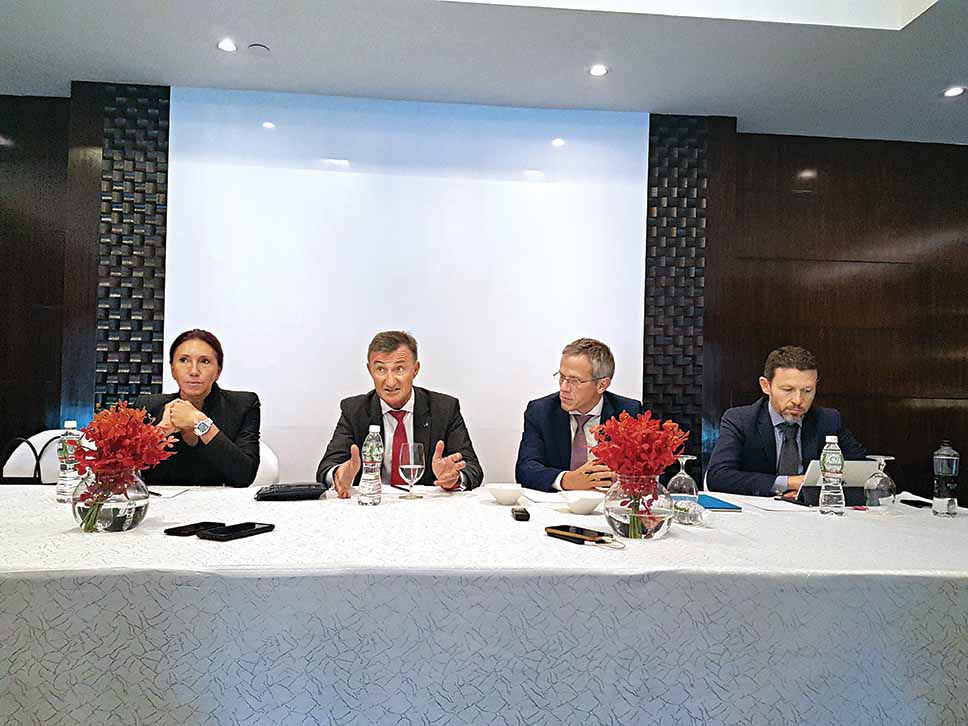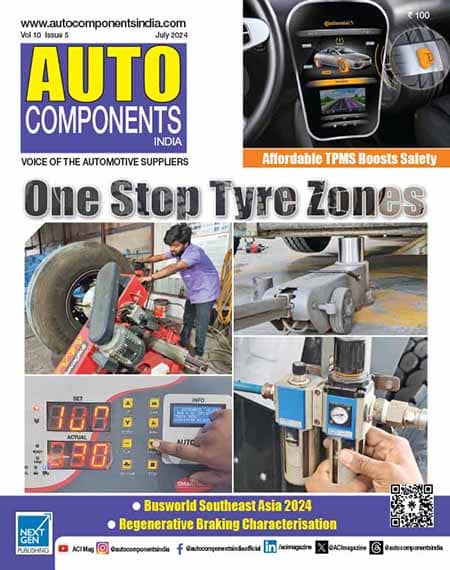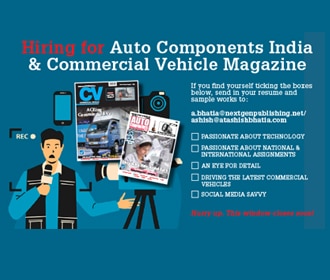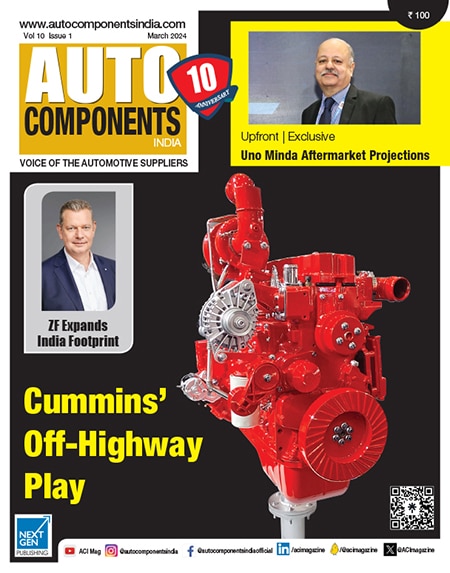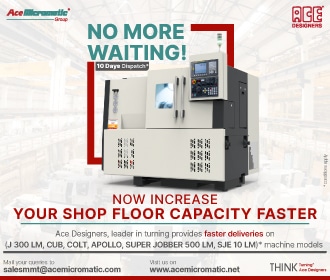At the 3DExperience Forum 2020, Dassault Systemes focussed on attaining leadership in manufacturing and infrastructure, in a post-Covid era.
Story by: Ashish Bhatia
With inputs from Deven Lad
Dassault Systemes 3DExperience Forum 2020 was different this year. Held virtually, it focussed on learnings derived from a once in a century occurrence – SARS-CoV-2. It also discussed in-depth, the role of technology and how customers are required to adopt the new normal of a virtual world friendly ecosystem.
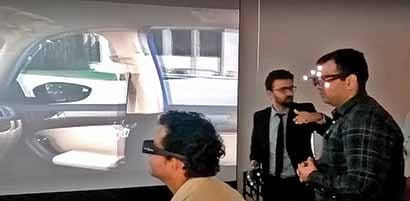
Team ACI in a demo of the seven-channel 3D environment with HD projection at the 3DExperience Forum India, in 2017.
Averred Deepak NG, Managing D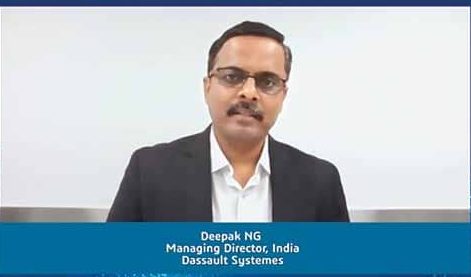 irector at Dassault Systemes India, “Through the ‘Experience is Human’ theme, we are focussing on leadership in manufacturing and infrastructure as an aid to improve life on the whole.” Of the opinion that there is a tectonic shift in expectations from businesses, he said that the service providers and policy-makers were together determining a new approach. “Today 69 per cent automotive consumers consider a healthy configuration as their top priority over comfort and price,” he stated.
irector at Dassault Systemes India, “Through the ‘Experience is Human’ theme, we are focussing on leadership in manufacturing and infrastructure as an aid to improve life on the whole.” Of the opinion that there is a tectonic shift in expectations from businesses, he said that the service providers and policy-makers were together determining a new approach. “Today 69 per cent automotive consumers consider a healthy configuration as their top priority over comfort and price,” he stated.
Elaborating on it, Bernard Charles, Chief Executive Officer at Dassault Systemes cited the learnings gathered in recent months. Expressed Charles, “The pandemic reveals that we can invent new experiences or solutions for customers during a crisis.” “We have been able to leverage this at a global level and our solutions have helped both in the improvement of logistics and risk reduction,” he claimed. The forum drew attention to an evolved ‘3DExperience’, claimed to offer an inclusive and a sustainable system of operations to the stakeholders of the automotive industry including aeronautics.
Deploying 3DExperience
On optimising the entire value chain, the focus was drawn on supply chain design, inventory planning, integrated supply chain and ‘order promising’ using ‘DELMIA Quintiq’. Aimed at better planning and optimisation of the entire value chain, the product, offers companies a tool to model, plan and optimise business operations end-to-end. It encompasses complex production value networks, intricate logistics operations besides helping in planning and scheduling large, geographically diverse workforces. Predictive and prescriptive data analytics, forecasting, what-if scenario planning, collaborative decision making, disruption handling and production scheduling are some of the key USPs.
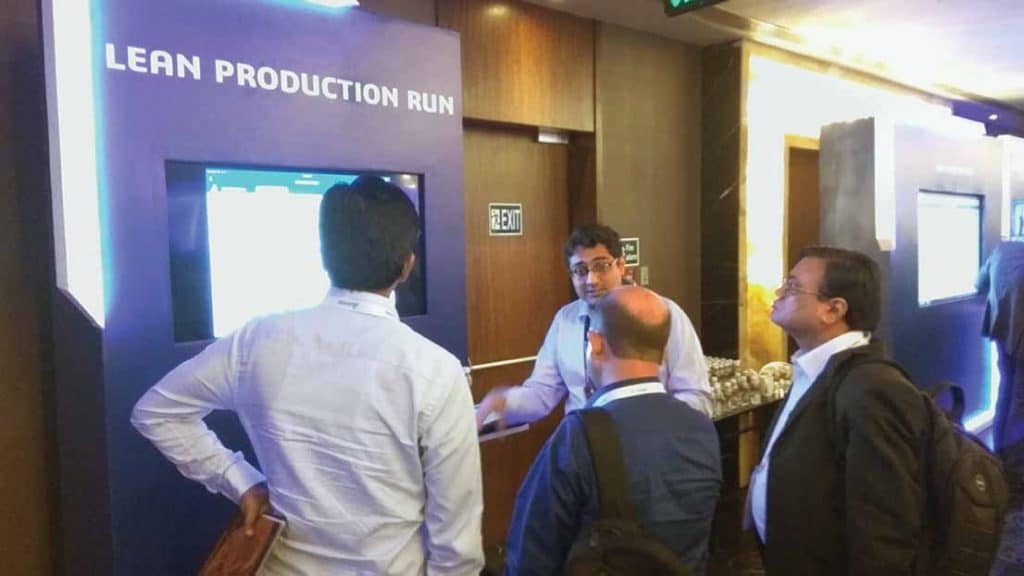
Predictive and prescriptive data analytics, forecasting, what-if scenario planning, collaborative decision making, disruption handling and production scheduling are the key USPs.
In supply chain design, it facilitates strategic, long-term planning based on which informed decisions can be taken on the plant or capital investments and divestments, product-mix portfolio, inventory and outsourcing and customer service strategies. By comparing optimised scenarios through Key Performance Indicators (KPIs), it is claimed to provide valuable insights to help assessment of profitability, efficiency and sustainability of the chosen configuration. In inventory planning, it accounts for complexities like supply chain segmentation, seasonality, multiple stocking locations and the expanding the range of products known to have shorter lifecycles. Real-time visibility, minimal excess and obsolete stock, financial modelling, multi-echelon optimisation (determining the optimal mix of finished and semi-finished goods, components and raw materials and strategising for made-to-stock, finish-to-order and make-to-order) and helping in making accurate calculations of safety stock levels factoring demand uncertainty and supply variability are some of its USPs.
Of the opinion that the product portfolio of automotive companies was evolving at an accelerated pace with the advancement in electric mobility and vehicle simplification, Charles drew attention to advancement in battery technology as an example. He opined, “The current vehicles are rather complex with scope for further simplification and it was time India played up on simplification, agility and capacity for inclusiveness of the new science at the core of its innovations.”

Florence Verzelen, Executive Vice President, Industries, Marketing and Global Affairs at Dassault Systemes
Safeguarding supply chain and ecosystem
Florence Verzelen, Executive Vice President, Industries, Marketing and Global Affairs at Dassault Systemes spoke of the need to prioritise employee welfare, financial health, marketing and sales, safeguarding supply chain and the ecosystem on the whole. At a time when India is becoming important to the global supply chains in their China plus strategies, she highlighted the importance of tapping higher localisation levels under the ‘Make in India’ initiative. On the operational front, she explained that to help customers and employees to continue work in manufacturing plants, there are solutions to ensure Sars-CoV-2 does not penetrate the factories. To offer the flexibility of remote working, Dassault is also offering cloud solutions across automotive sectors including in aerospace.
To highlight the evolution of 3DExperience, David Zeigler, Vice President, Aerospace and Defense Industry at Dassault Systemes gave an overview of the digital thread. He cited a case study of Lockheed Martin leveraging it to drive increased affordability, efficiency and collaboration throughout the lifecycle. Renee Pasman, Director of Integrated Systems for Advanced Development Programs (ADP), Lockheed Martin Aeronautics explained that the collaboration was aimed at building a digital thread extending from design to manufacturing of their next-generation products. Focussed on predicting what’s next through 3DExperience customers, claimed Pasman, customers could look forward to total control over the cradle-to-cradle approach.
Combining CAD with a model-based system engineering approach through the use of next-generation product lifecycle management tools, manufacturers can look forward to advanced collaborations with suppliers covering key areas like conceptual design, requirements management, system engineering, modelling and simulation, digital manufacturing, virtual and real-time, manufacturing optimisation management, certification and qualification, logistics and sustainment, she explained.
Abhishek Burman, Founder Director & CEO, General Aeronautics gave a perspective on how to support clients to reinvent their business and adapt their design and ecosystems to the current situation. Dr Abhay Pashilkar, Program Director (Civil Aircraft Projects), CSIR – National Aerospace Laboratories talked about an overview of how CSIR – National Aerospace Laboratories is leveraging 3DExperience platform to adopt passenger centricity in civil aircraft design and development with the passenger experience solution and ergonomics, perceived quality in terms of visualisation and materials used besides the using of immersive AR/VR available on the Dassault platform. To accelerate aircraft development, for instance, he advocated the need to implement the system that provides control of product record across development stages, from concept to design in a bid to overcome dated practices lacking templated processes, manual design processes and related legacy data control, and data dispersal through a wide variety of organisational departments.
Ecosphere and frugal engineering
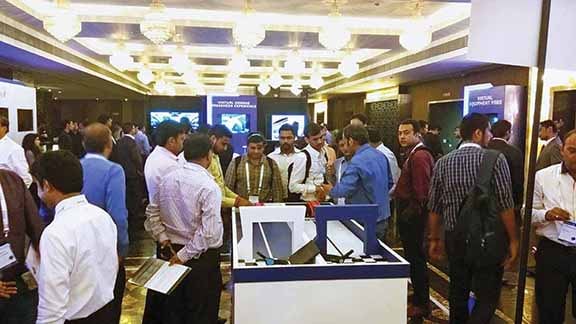 Charles praised Indian universities for adopting the new digital way to create curricular competency centres to train the new generation in agility. “India is well poised to play that card with the evolution of degree education in innovation centres,” he opined. Added Verzelen, Dassault Systèmes, through the partnerships with Universities was banking on its Centre of Excellence (CoEs) to showcase the experiential innovation and product development in a bid to contribute to localised solutions. Dr E V Ramana Reddy, IAS, Additional Chief Secretary to Government of Karnataka and Koodli Subramanya, Sales Director, Innovative Business, Dassault Systemes called for the industry, the government and academia to collaborate for skilling the workforce. He opined that the country was not losing jobs but failing to adopt new technology and therefore the need to skill for survival is more pronounced. “The need of the hour is to rapidly transfer digital practices from industry to the learning sphere with the country at the threshold of Industry 4.0,” he mentioned. “With India expected to have a workforce of around 250 million by 2030, the role of the government, academia and the industry is to help the country realise its vision of turning a global supplier of skilled manpower,” he concluded. ACI
Charles praised Indian universities for adopting the new digital way to create curricular competency centres to train the new generation in agility. “India is well poised to play that card with the evolution of degree education in innovation centres,” he opined. Added Verzelen, Dassault Systèmes, through the partnerships with Universities was banking on its Centre of Excellence (CoEs) to showcase the experiential innovation and product development in a bid to contribute to localised solutions. Dr E V Ramana Reddy, IAS, Additional Chief Secretary to Government of Karnataka and Koodli Subramanya, Sales Director, Innovative Business, Dassault Systemes called for the industry, the government and academia to collaborate for skilling the workforce. He opined that the country was not losing jobs but failing to adopt new technology and therefore the need to skill for survival is more pronounced. “The need of the hour is to rapidly transfer digital practices from industry to the learning sphere with the country at the threshold of Industry 4.0,” he mentioned. “With India expected to have a workforce of around 250 million by 2030, the role of the government, academia and the industry is to help the country realise its vision of turning a global supplier of skilled manpower,” he concluded. ACI
Injection Molded Structural Electronics
Injection Molded Structural Electronics (IMSE) is making electronic circuitry and functionality part of the 3D structure to eliminate the need for mechanical buttons and switches. For instance, In-mold Electronics (IME) technology developed by TactoTek of Oulu, in Finland. Unlike in traditional electronics, this technology encapsulates functionality within thin injection-moulded plastic and responds to touch. With the help of touch-activated controls under a thin and smooth surface, IMSE successfully eliminates crumb-collectors and visual clutter, in turn, helping automotive manufactures create beautiful vehicle surfaces as controls for lighting and other electronic functions. Said to be getting the recognition it deserves, Computer-Aided Design (CAD) developers are known to be supporting IMSE at the software design level.


